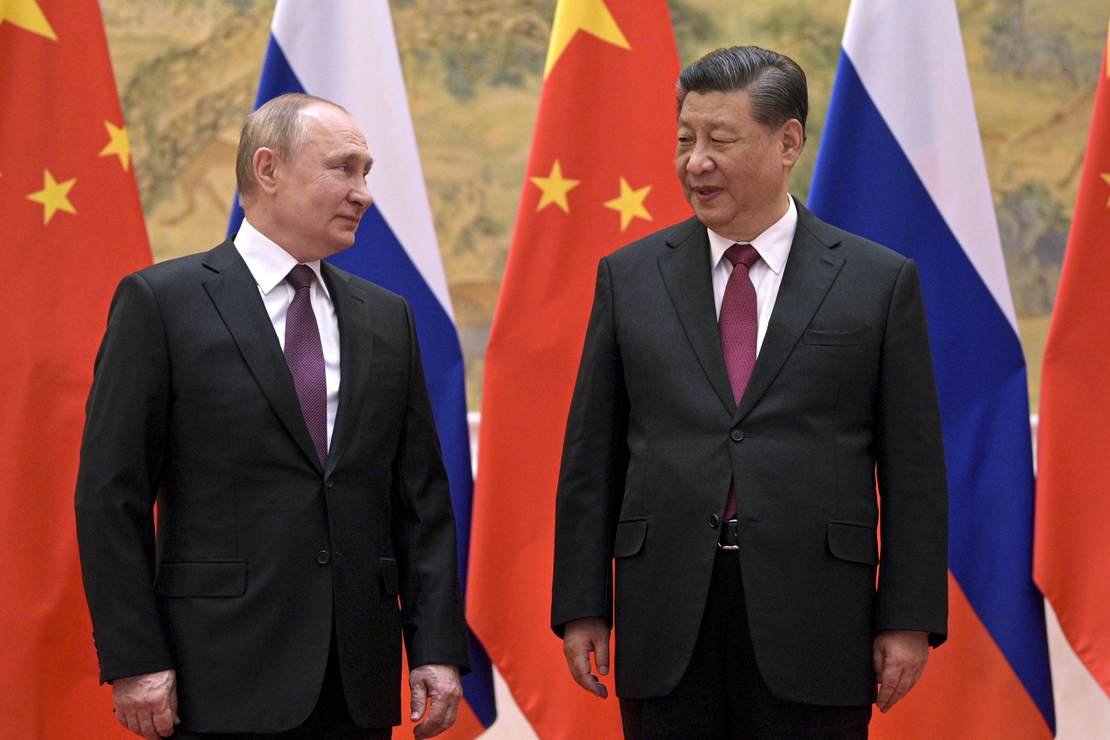
It’s unlikely that they are, especially since the two countries announced their new “no limits” partnership just a few weeks ago. That was their way of declaring that they’re tired of the Pax Americana and intend to carve out “spheres of influence.” Surely the Chinese understood what that would mean for Ukraine sooner or later.
Yet there’s tantalizing reporting over the past few days speculating that Beijing was as surprised as anyone to see Putin bring down the hammer. Which stands to reason, as even plenty of *Russian* analysts were caught off-guard by the invasion.
The Times has a report today about the White House’s futile effort over many months to convince China that Putin was planning to attack Ukraine and that it would be in everyone’s interest if he didn’t, including Beijing’s. Knowing that China is Russia’s most important partner, the U.S. hoped Xi would be willing to lean on Putin to stand down and pursue diplomacy. China either wasn’t interested or didn’t believe the U.S. intelligence despite the best efforts of American diplomats to explain how sanctions imposed on Russia would indirectly bite China as well.
Each time, the Chinese officials, including the foreign minister and the ambassador to the United States, rebuffed the Americans, saying they did not think an invasion was in the works. After one diplomatic exchange in December, U.S. officials got intelligence showing Beijing had shared the information with Moscow, telling the Russians that the United States was trying to sow discord — and that China would not try to impede Russian plans and actions, the officials said…
In addition to laying out the intelligence, the White House officials told the [Chinese] ambassador that the United States would impose tough sanctions on Russian companies, officials and businesspeople in the event of an invasion, going far beyond those announced by the Obama administration after Russia seized Ukraine’s Crimean Peninsula in 2014.
The U.S. officials said the sanctions would also hurt China over time because of its commercial ties.
The ambassador was “skeptical and suspicious,” according to the Times. Skeptical and suspicious that Russia would really invade or skeptical and suspicious that the west really would slam Russia with harsh sanctions after declining to do so following Putin’s 2014 incursion into Ukraine? Or both?
Yesterday WaPo also flagged some circumstantial evidence that China had been taken by surprise by Putin’s attack on Ukraine:
Despite the outward show of mutual support between the two countries, there have been indications that China was caught flat-footed by Russian President Vladimir Putin’s announcement of military action.
Minutes after the declaration, China’s representative to the United Nations, Zhang Jun, told a Security Council meeting: “We believe that the door to a peaceful solution to the Ukraine situation is not fully shut, nor should it be.”…
Yun Sun, director of the China program at the Stimson Center, noted Tuesday that the Chinese policy community appeared to be in “shock” at the sudden escalation of fighting after having “subscribed to the theory that Putin was only posturing and that U.S. intelligence was inaccurate as in the case of invading Iraq.”
Hardly anyone outside the intelligence bureaus of NATO countries thought Putin would actually do it. Now he’s done it. And not only has he done it, the west really does seem to be moving towards draconian sanctions in response. It’s not all talk this time:
#Breaking German Finance minister says Berlin is open to cutting #Russia from SWIFT
— Michael A. Horowitz (@michaelh992) February 25, 2022
Italy has now changed its position on SWIFT. It now backs removing Russia. The only countries still not behind this step are Cyprus & Hungary. Massive massive step forward https://t.co/B96WkxnO86
— Blake Allen (@Blake_Allen13) February 25, 2022
China suddenly finds itself saddled with a close ally who might be less rational than they thought, a loose cannon possibly prepared to risk his own hold on power in Russia and his country’s financial stability on a quixotic bid to smash NATO and reabsorb eastern Europe.
That’s a bad way to start the Sino-Russian honeymoon.
There’s also this curious statement from this afternoon:
READ RELATED: Queen’s Platinum Jubilee: How the UK will mark milestone with four days of joyous celebrations
#China “firmly advocates respecting and safeguarding the sovereignty and territorial integrity of all countries… and it applies equally to Ukraine,” states Foreign Minister Wang Yi. https://t.co/teDz3f2hYD pic.twitter.com/rRhjvcfJVB
— Steve Herman (@W7VOA) February 25, 2022
I’m resisting the urge to read too much into that. China has consistently said that it respects Ukraine’s sovereignty while also acknowledging Russia’s “legitimate security concerns.” Presumably its no-exceptions policy on sovereignty is a way to protect its own claim to Taiwan: Because China insists that Taiwan is part of its own country, not a separate nation, when the day comes for China to put down the “rebellion” there it expects the international order to respect its sovereignty in doing so. But even so: There’s no way around the conflict in Russian and Chinese rhetoric about Ukraine. Putin’s rationale in attacking Ukraine was that it has no sovereignty, that it’s not a real country but rather some breakaway province of Russia. China formally disagrees, it seems. How do they reconcile their positions?
One more thing. Two of China’s state-owned banks have decided to restrict financing for purchases of Russian commodities. “China’s four largest banks have complied with previous U.S. sanctions against Iran, North Korea and even top officials in Hong Kong because they need access to the U.S. dollar clearing system,” a source told Bloomberg. If we’ve now reached the point where Russia is about to be kicked out of SWIFT, China may be faced with an agonizing choice: They can continue doing business with Russia or they can continue doing business with the west but they can’t do both, at least not to the extent they’re used to. China can’t afford to alienate Russia, which supplies it with energy. But it also can’t afford to risk access to western financial markets. No wonder Xi is reportedly encouraging Putin to pursue diplomacy with Ukraine and end the escalation.
By the way, if the two allies are counting on Americans to resist sanctions because they’re already fed up with inflation, they’ve miscalculated:
Post-ABC poll finds bipartisan support for sanctions against Russia, with negative ratings for Biden’s handling of situation. Story w/@EmGusk @danbalz https://t.co/8v4FLPhPKC pic.twitter.com/9WKS60gtQ9
— Scott Clement (@sfcpoll) February 25, 2022
I’ll leave you with this news, a rare case of the U.S. directly sanctioning a foreign leader. America had resisted slapping sanctions on Putin for more than 20 years, but no more. His assets have also been frozen in the UK and EU, as well as those of his foreign minister. The sense is growing that he underestimated western resolve to punish him for attacking Ukraine. It may be growing in Beijing too.
NEW: The US is planning to impose sanctions on Russian President Vladimir Putin as soon as Friday
—@Phil_Mattingly reports https://t.co/8fsWGUZgE3 pic.twitter.com/rDRKqmuMnZ
— Josh Campbell (@joshscampbell) February 25, 2022
Update: China found a limit to the “no limits” partnership.
Helluva moment at the UN.
Russia presides over a security council resolution vote on condemning Russian aggression in Ukraine, and is the only country to vote no, vetoing it.
11 vote yes
3 abstain: China (!), India, UAE
👆 via @Abs_NBC
— Sahil Kapur (@sahilkapur) February 25, 2022
Source:






